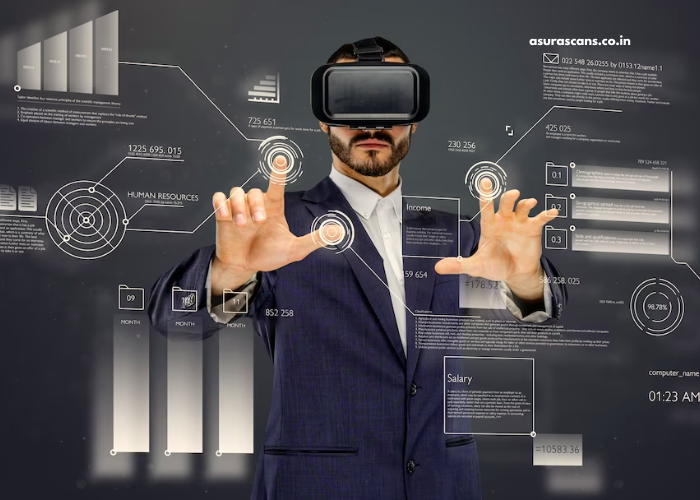Technology has always been a driving force behind human progress. Over the years, we have witnessed some extraordinary innovations that have transformed every aspect of our lives. From the invention of the wheel to the dawn of the internet age, each step forward has brought us closer to realizing new possibilities. Today, we stand on the brink of a new era, as cutting-edge tech innovations continue to shape the world in ways we never thought possible.
In this article, we will explore the key technological advancements that are not just changing our present but are set to revolutionize the world of tomorrow. These innovations, ranging from artificial intelligence to quantum computing, are expected to have profound impacts on industries, economies, and even how we live our daily lives. So, let’s dive into the tech innovations shaping tomorrow’s world.
Artificial Intelligence (AI) and Machine Learning (ML)
Artificial Intelligence and Machine Learning are undoubtedly at the forefront of technological innovation. Over the last decade, AI has transitioned from a concept seen in science fiction to a tangible reality. Today, AI is already transforming various industries, from healthcare to finance and entertainment.
AI’s ability to process vast amounts of data and make informed decisions is enabling more personalized customer experiences. In the healthcare industry, AI is being used for predictive analytics, disease diagnosis, and drug development. Algorithms can analyze medical images with a high degree of accuracy, detecting early signs of diseases such as cancer, making early interventions possible.
Machine Learning, a subset of AI, is also driving innovations in autonomous vehicles. Self-driving cars are now a reality, with companies like Tesla, Waymo, and others working relentlessly to make autonomous vehicles safer and more efficient. As AI continues to evolve, the integration of machine learning with other technologies promises a future where intelligent systems can learn, adapt, and improve on their own.
5G and the Internet of Things (IoT)
The deployment of 5G technology is one of the most significant tech innovations in recent times. With ultra-fast internet speeds and minimal latency, 5G is set to change the way we connect with the world. This new generation of mobile network technology is not just faster than its predecessors; it is designed to handle the growing demand for connectivity in an increasingly digital world.
5G’s influence will be felt across multiple sectors, from healthcare and entertainment to smart cities and manufacturing. For instance, in healthcare, 5G-enabled telemedicine can offer real-time remote consultations with specialists, allowing better patient outcomes. Meanwhile, in the entertainment industry, 5G will enhance virtual reality (VR) and augmented reality (AR) experiences, enabling more immersive gaming, live-streaming, and interactive content.
The Internet of Things (IoT) is another key innovation powered by 5G technology. IoT refers to the network of interconnected devices that can communicate and share data with each other. From smart homes to connected factories, IoT is revolutionizing how we manage everyday tasks. In smart homes, IoT devices can control everything from lighting to security systems, all through voice or app-based commands. In industries, IoT is optimizing production lines, ensuring predictive maintenance, and improving supply chain management.
Quantum Computing
Quantum computing is a groundbreaking field of study that holds the potential to solve complex problems that are currently beyond the reach of classical computers. Unlike traditional computers that process information in binary (0s and 1s), quantum computers utilize quantum bits, or qubits, which can exist in multiple states simultaneously. This allows them to perform computations at an exponentially faster rate.
One of the most exciting applications of quantum computing lies in its potential to revolutionize fields such as cryptography, material science, and drug discovery. In the field of cryptography, quantum computers could render traditional encryption methods obsolete, leading to the development of more secure communication systems. In material science, quantum simulations could help scientists develop new materials with properties tailored to specific needs, such as superconductors or lightweight alloys.
However, while quantum computing holds enormous potential, it is still in its infancy. The development of stable and scalable quantum computers remains a significant challenge, but companies like IBM, Google, and Intel are making great strides toward realizing this vision.
Blockchain Technology and Decentralized Finance (DeFi)
Blockchain technology, often associated with cryptocurrencies like Bitcoin, has evolved far beyond its initial use case. At its core, blockchain is a decentralized, distributed ledger that allows secure, transparent, and tamper-proof transactions. This innovation has far-reaching implications beyond cryptocurrency.
One of the most notable applications of blockchain technology is in the field of finance. Decentralized Finance (DeFi) is an emerging sector that aims to disrupt traditional financial systems by enabling peer-to-peer transactions without intermediaries such as banks. DeFi platforms leverage blockchain to offer services like lending, borrowing, and trading, all while ensuring greater transparency and reduced risk.
Blockchain is also being used to improve supply chain management, digital identity verification, and even voting systems. In supply chains, blockchain can provide real-time tracking of goods, ensuring greater transparency and reducing the risk of fraud. In digital identity verification, blockchain can help individuals maintain control over their personal information, reducing the risk of identity theft.
Augmented Reality (AR) and Virtual Reality (VR)
Augmented Reality (AR) and Virtual Reality (VR) are two technologies that are revolutionizing industries such as gaming, education, retail, and healthcare. While VR immerses users in a fully digital environment, AR overlays digital content onto the real world, enhancing the user’s perception of their surroundings.
In the gaming industry, VR is already offering players an immersive experience, where they can physically interact with the game world. VR headsets such as the Oculus Rift and PlayStation VR have gained popularity, and the technology is only expected to improve in the coming years, with more realistic graphics and smoother interactions.
In retail, AR is changing the way customers shop. For instance, furniture retailers like IKEA have developed AR apps that allow customers to visualize how furniture pieces will look in their homes before making a purchase. Similarly, fashion retailers use AR to allow customers to try on clothes virtually, enhancing the online shopping experience.
The healthcare sector is also benefiting from AR and VR. Medical professionals are using VR simulations for training and surgeries, while AR is being used in surgery to provide real-time data to doctors, improving precision and reducing errors.
Biotechnology and Genetic Engineering
Biotechnology is advancing at an unprecedented rate, with breakthroughs in genetic engineering, CRISPR technology, and personalized medicine. One of the most significant advances in biotechnology is gene editing, which allows scientists to modify the DNA of organisms with great precision. The CRISPR-Cas9 technique has opened new possibilities for treating genetic disorders, such as sickle cell anemia and cystic fibrosis.
Additionally, advancements in personalized medicine are making treatments more tailored to individuals based on their genetic makeup. By understanding a person’s genetic code, doctors can create personalized treatment plans that are more effective and have fewer side effects.
Biotechnology is also playing a crucial role in sustainable agriculture. With the global population steadily increasing, there is a growing need to produce more food using fewer resources. Genetically modified crops that are resistant to pests, drought, and disease are helping ensure food security while reducing the environmental impact of farming.
Autonomous Vehicles and Robotics
The development of autonomous vehicles is one of the most anticipated innovations of the 21st century. Self-driving cars have the potential to revolutionize transportation by reducing traffic accidents, improving fuel efficiency, and enhancing mobility for those unable to drive. While fully autonomous cars are not yet widely available, companies like Tesla, Waymo, and Uber are already testing autonomous vehicles in controlled environments.
Robotics is another area that is rapidly advancing. In industries such as manufacturing, robots are already performing repetitive tasks more efficiently than humans, leading to higher productivity and lower costs. In healthcare, robots are being used for minimally invasive surgeries, providing greater precision and reducing recovery time for patients.
The rise of robotics and automation also raises questions about the future of work. As robots take over routine tasks, there will be a need for reskilling workers to adapt to new roles in this evolving economy.
Sustainable Energy Solutions
As the world grapples with climate change, the demand for sustainable and renewable energy solutions is growing. Solar power, wind energy, and hydrogen fuel cells are all part of the push toward reducing our dependence on fossil fuels and lowering carbon emissions.
Solar energy technology has made significant progress in recent years, with more efficient solar panels being developed. The cost of solar energy has dropped dramatically, making it a more viable option for both consumers and businesses. Similarly, wind energy is becoming increasingly efficient, with larger and more powerful wind turbines being developed to harness the power of the wind.
Hydrogen fuel cells are another exciting development in sustainable energy. Hydrogen-powered vehicles are expected to become more common, offering a clean alternative to gasoline and diesel-powered cars.
Conclusion
The tech innovations shaping tomorrow’s world are not just transforming industries but are also reshaping the way we live, work, and interact with each other. From artificial intelligence and quantum computing to blockchain and sustainable energy solutions, the future holds immense possibilities. However, with these advancements come challenges such as ethical concerns, security risks, and the need for proper regulations.
As we move forward into this exciting new era, it is crucial for businesses, governments, and individuals to collaborate and harness the power of technology responsibly. By doing so, we can create a future that is not only technologically advanced but also equitable, sustainable, and beneficial for all. The world of tomorrow is being shaped today, and the innovations we embrace now will define the generations to come





